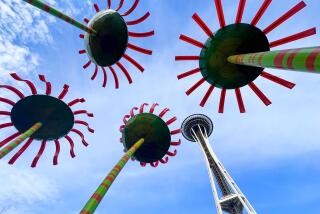Risky Family Business Beats Life as Landlubber : Young Man and the Sea: a Strong Lure
GIG HARBOR, Wash. — His father was a commercial fisherman. So was his father’s father. It follows, then, that Randy Babich was expected to become . . . a dentist?
“Every fisherman tried to coax his son into something other than fishing. They thought a steady job on land, with a steady paycheck, was less risky,” Babich said recently, sitting on the family dock and thinking how lucky he was to have rejected that advice.
Like his forebears, Randy Babich has chosen the sea. In doing so, he helps to preserve a maritime heritage that has distinguished Washington’s development since the first white settlers arrived.
Sea traders plied the coast starting in the 1700s, looking for furs. Even after the railroad arrived in 1883, most settlers who rode the rails westward passed up Washington’s arid eastern plains, preferring tidewater towns such as Seattle and Tacoma.
Protected Coastline
Unlike much of the Pacific coast, where great ocean swells pounded the shore, Washington’s island-studded Puget Sound offered miles of protected coastline. Salmon and other fish were abundant, and the waterways became highways for ships hauling timber cut from tall forests.
Randy’s grandfather, Spiro Babich, came from Yugoslavia in 1910, about 40 years after the first whites settled in Gig Harbor. Two of the town’s founders were Yugoslav fishermen, and they started a Slavic connection still obvious in the local phone book, where Jerisich, Markovich and Stanich are well represented.
Spiro Babich was a typical immigrant: He had no money and spoke no English, but he learned fast. He soon had his own boat and used it to pursue salmon zealously. It is said that he used to pray for bad weather so the timid would go ashore and leave more fish for him. When he died at 67, he was planning to fish the next summer.
One of his two boats went to son Peter, who fished until retiring last year at 65. “Talk about a duck out of water,” Randy Babich said of his father. “He’s going to be leasing a boat for the fall, just so he can go out and fish once a week.”
Randy, 39, with a bachelor’s degree from the University of Washington, could have avoided the dangerous fisherman’s life. But his exposure to the workaday world of landlubbers gave him an appreciation of fishing that his grandfather’s generation couldn’t match.
“If they knew about commuting to work every day on the freeway, fighting traffic, they’d have come home and kissed their deck winch,” Babich said.
Fishing today is easier in many ways. Whereas his grandfather pulled up heavy, tarred-cotton nets by hand, Babich uses a power winch to haul nylon nets aboard the Paragon, his 56-foot seiner.
But hazards remain. The weather is as unpredictable as ever, and Babich, like most Washington fishermen, now must motor up to the distant waters of Alaska to make a living. He complains about strict regulations, foreign competition and outrageous insurance rates.
Lately his son, Stefan, 19, has been helping on the boat. But just to work his way through school, you understand.
“I encourage him not to follow fishing,” Babich said.
More to Read
Sign up for Essential California
The most important California stories and recommendations in your inbox every morning.
You may occasionally receive promotional content from the Los Angeles Times.








